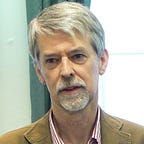Against Sapiocentrism
In the late 1980s, I published a poem, ‘Auden’, in the Spectator, in the style of his late 1930s sonnets on various themes. My poem tried to sum up, using Auden’s vivid thumbnail technique, the moral stance of one of my favourite poets and thinkers. It focuses on humility, a running theme in Auden’s work, concluding:
He preached salvation though humiliation
(his motto: ‘Don’t forget that you’re a heel),
That man, like microbes, had his proper station.
At the time, I knew nothing about microbes. I simply chose them as an emblem of lowliness and for the alliteration. I remained pleased with this poem long after I wrote it although I stopped writing and publishing poetry three years later.
The mind can run on rails. For the past 20 years I have been writing and publishing articles and books on biological themes, over the last few years focusing increasingly on microbes, in particular bacteria, following the work of pioneers such as Lynn Margulis, Paul Falkowski, and Nick Lane. But I made no connection with the Auden poem until I came across it again whilst going through old papers.
What I learnt in the years after poetry was that the earth was the bacteria’s oyster for more than 2 billion years before other life forms — multicellular forms — evolved from them; not only that but all of the marvellous intricate machinery of life possessed by every living soul today evolved in bacteria and is little changed in every organism, including ourselves, today. As an example, the ribosomes, the fantastically intricate nanomachines that produce from a DNA code every protein on earth, are so little changed between bacteria and human beings that the detailed structure of this vital machine was first deduced in bacteria.
The importance of bacteria does not lie only in this ancient feat of evolution but in their role as planetary regulators of the flux of elements between the air, the earth, living things, and water, creating the totality of the biosphere. The oxygen atmosphere was created entirely by the early photosynthesising cyanobacteria and half the world’s oxygen today is produced in the oceans by the same organisms. Only a few bacteria and a polluting industrial process invented in 1913 can harvest vital nitrogen from the air to incorporate it into living things, and much of the earth’s mineral bounty, including iron, chalk and limestone were produced by bacterial processes.
So although we knew nothing about the existence of bacteria until the mid 19th century and even then regarded them almost entirely as malign organisms that cause disease, in the environmental crisis we now face we realise that the planetary controllers are not ourselves but bacteria. — or at least a few of us do. This humbling realisation brings me back to the Auden poem. Of course I was wrong — I realise so belatedly — to reach for microbes as an automatic emblem of the lowest of the low. Bacteria are the creators of life and the planet’s operating system, whilst we are the despoilers of their work. Certainly, human hubris needed to be taken down, as Auden tried to do, but in my poem I appropriated the bacteria unfairly: it is they that show us how deluded is our assumed grandeur.
A parallel for our great error can be found in H G Wells’ Eloi and the Morlocks in The Time Machine (1895). The Eloi are gentle hippyish creatures who play like children in the sun. But the truth of their life is that they are mere food for the Morlocks, savage brutes who live underground and rise at night to devour their prey.
It is not that microbes are Morlocks, although their origins in the sulphurous depths of the primordial ocean might seem Morlockian, and of course the great microbial plagues really did seem to pit this realm of creation against humanity. But the essential collision has been between humanity bent on making the world comfortable for themselves in a world they thought they owned whilst the real rulers of the planet, the microbes and their nanomachines, trading gases with the air, the soil and the waters, were always in time going to make a mockery of this human way of trying to run the planet.
Having written a book, Nanoscience: Giants of the Infinitesimal (2014), celebrating the wonders of the natural and human nanoworlds, I realise only too well the difficulty in getting human beings who live within a certain restricted middle-range field of vision to take seriously the nanoworld: things that we can only see through very powerful electron microscopes or through scientific deduction. But, actually, it is necessary that we cast aside our sapiocentrism, because the world is not what we thought it was. It was not given to us by God to dominate: it is our job to learn our true role in it.
So now I see that the last line of the poem has a resonance I couldn’t possibly have recognised when I wrote it. Our “proper station” now consists in taking the microbes seriously. Given the state of the world as I write, with multiple crises from Ukraine, through the environment, to the worldwide attack on truth and science, it seems a tough call to get people to realise what an increasing number of scientists know very well.
But, as Paul Falkowski, the most urgent proponent of the important to bacteria has written, “Microbial life can easily live without us; we, however, cannot survive without the global catalysis and environmental transformations it provides”.
